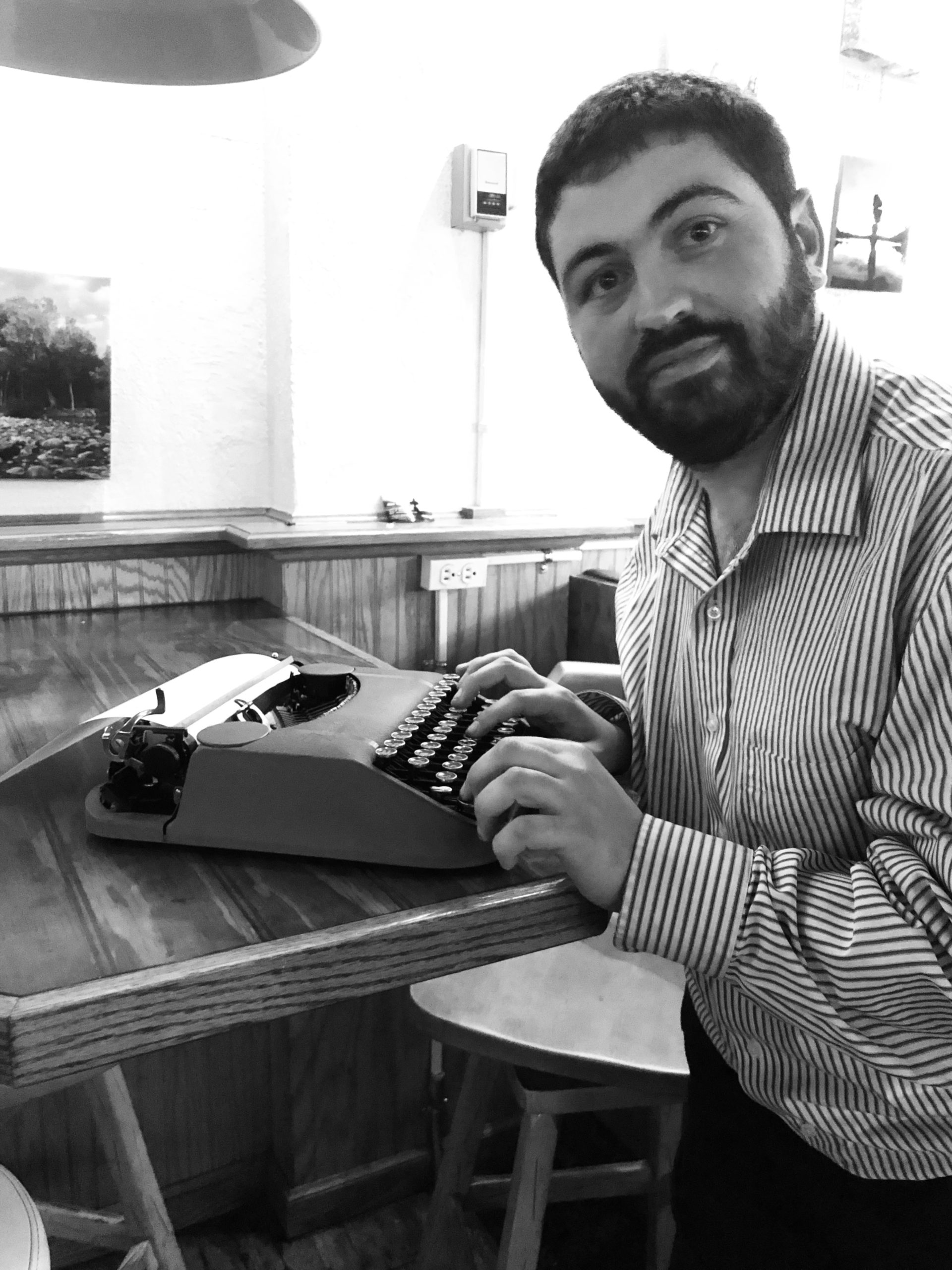Risk
Go to the bank for the fifth time to pursue that loan, the loan that’ll bring her back. Resurrect your love. Help authors again. Publish the books the world needs— short story collections about love. Novels about loss. Stories about what the American Dream is supposed to be.
This might be futile, but you have to try. You cannot work your days and early evenings in Mama Lily’s Coffee Shop, pouring vanilla rooibos tea for people like Carla Pritchard, who smells like coconut shampoo, musk, and gas, and has the charm of Lavrenti Beria. Or serving oversized Diet Cokes to Gavin Parnell, who has coiffed raven-colored hair, reeks of Old Spice, and makes Idi Amin look like Gandhi. You cannot spend nights in an apartment full of dust. A bed that’s too damn big, but you couldn’t get rid of. It still smells of her lavender perfume a year after it and two years after you lost your publishing company.
The bank representative, Connie, who wears massive aviator shades, a Pepto-Bismol colored suit, and has a voice that sounds like Fran Drescher, reviews files on a computer screen that hums away. This is your financial life, compressed within an electronic file. Everyone says they deserve a second chance; you truly do. This time, you won’t spring for the most expensive printers; you’ll do more social media outreach. You’ll dress up as a giant book and dance around Custer Avenue, if need be. And you’ll try to promote more active genre fiction—to move beyond your stubborn fealty to literary fiction.
Above all, you’ll keep an eye on the accounts. You won’t run from the bad.
Connie hums, what sounds like “Hotel California,” while people rush in and out. You hate the Eagles. On top of that, disembodied speakers blast ‘50s standards, the music echoing across cinnamon and turd-colored walls. Three banks of tellers’ booths and desks surround a carpeted space with rows of chairs and round glass desks. A giant American flag hangs from the ceiling. Pictures of mustachioed robber barons in bowler hats glare at you, men who had no qualms about crushing others to get their power. Part of you envies them. Other men and women in Khakis and chinos and smart skirts hunch behind other counters. A Santa Claus-lookalike thanks a teller for taking a chance on a fusion Persian and Australian restaurant (Perhaps there’s hope if he’s getting a loan on something this ridiculous).
A woman in a lavender suit hunches at the counter next to yours and says, “I’m trying to open an indie theater, you see.” Her voice reminds you of Cate Blanchett in Carol, and your mother and sister’s voices.
“Well, I’ll be frank with you,” her teller says. “I would consider pursuing, well, a more lucrative route…”
Connie calls you, snapping you out of your reverie.
“So, you’re really committed, I see,” Connie says, as she scrolls through more unseen information. God knows what. The first credit card you maxxed out? The second credit card you maxxed out when you were opening Ghost Train? The fourth and the fifth ones that you and Anastasia lied (you still feel wellsprings of shame) to get to upgrade the computers and printers?
“I am.” You realize you’ve swaying. Time to stand still. “I really believe that we need to foster a conversation about creativity, about the human condition.”
“But your first publishing house, well…” She pauses and takes a long swig of her coffee, smacking her lips.
“People make mistakes.”
“Wouldn’t you say that was a rather costly one?”
You inhale. Keep your temper in check. Your wife Anastasia says—said—you get wound up far too easily. You must get this loan; some things cannot be resurrected, but you can and must resurrect Ghost Train. Under a new name, though. You cannot think about the clickety-clack of train wheels, the way they crush so quickly, without mercy. The way people step in front of these giant monstrosities.
You think of Anastasia, the day Ghost Train opened. You’d started at that giant beige building, with its sleek windows, the future before you. Everything seemed so beautiful, the editor’s offices, the giant printers, the banks of computers humming, and yet so frightening.
“Don’t overthink it,” Anastasia had said, smiling, her old, beautiful, crooked grin. “There’s nowhere to go but up. Even if we lose along the way. We’ve done the hardest work, Nicky. We’ve put ourselves out there because we believe in this.
“I hope you’re right.” You’d smiled, taken her hand.
“I know I am.” She’d grinned again. “I married you, didn’t I?”
“Oh, so I’m a gamble, too?”
“The best kind.” She’d led you into your new kingdom, skipping along with a kind of ease you’ve always tried to hold onto, even though the memory has muddled a little.
“Mr. Botkin, did you hear me?” Connie pulls you back. “How do you explain that mistake?”
Now she looks at you like you’re naked in the middle of the bank. You don’t like this kind of judgment. You saw it in your MFA program, when you wrote second-person short stories, while your professors favored first. The first time you got a loan to open Ghost Train, and it took you ten banks to find someone who saw promise in literature. And then, of course, when Ghost Train began its descent and credit card companies became all too interested in you for the wrong reasons.
But you won’t lose your shit.
“We all make mistakes,” you say. “After all, this bank has been in existence for over a century. I’m sure the founders made their own shares.”
For a moment, you think of the actual Founders, Franklin and company, and smile. Talk about taking risks. If they could face bipolar King George, you can conquer a few bank reps. That’s what old Anastasia would have said.
“True. But we’re talking about you.” She keeps scrolling for a moment, then turns from her desk toward you.
“Here’s the thing.” You lean forward. Think of your meditation classes. Inhale. Visualize victory. “I’m committed. I’ve laid out a plan. A budget. A payment plan.”
You know you can, not that you’re the Little Engine That Could. But you’ll hire less editors. Have them work as independent contractors, pay them a little less, by a quarter, even half, even though that makes you feel like a cold capitalist.
But it’s a plan. Not the contour of a plan, but a plan.
Connie sighs and looks at you again. She taps her fingers on the desk, which is covered with papers, and a few hints of dust. You wonder about this woman’s own history. What has she lost? How has she ended up here? She strikes you as someone who’s held higher positions, who’s wielded far more power than she does now. Perhaps someone who’s had a business herself. And yet, she seems immersed in this new world of quick judgments and Faustian bargains.
“I’ve seen your plan,” she says. “But everyone has one.”
“This takes into account, well, the past complications.” You will not call it failure; Anastasia uttered that word like a chant after the closing.
“I was Little Miss Optimistic,” she’d told you one night, while slurping down Merlot. “I should have known. Why couldn’t I have been born a cynic?”
“There’s only room for one cynic,” you’d said. You were the cynic, the one who saw darkness even in the happiest of spaces, in the couples you observed on the streets, in feel-good movies about success, in Santas at the mall. Anastasia always had to pull you back.
“Well, make room for two.” She’d taken another long gulp, belched, and let out a laugh, not joyful, but broken, frightening. “I can’t believe we’ve made the same fucking mistakes my parents made. No I did. I told myself I could do better with finances than they did. At least we didn’t relinquish all our work to a bunch of mobsters.”
“We’re in this together.” I try to give her a kiss, but she pulls away.
Connie clears her throat now.
You’re not going to think about failure a second time, even though you’ll be on a tighter leash if you get this. That much is clear.
But you’ve learned. If only Anastasia could have held on just a little longer; a year longer.
But the world is always in a hurry, even the people you love.
“Let me review this with some of the higher ups,” Connie says. “I know you probably think I’m brushing you off, but it’s procedure. How does that sound?”
“How long would that take?”
She sighs again.
“Well, it depends. It might be a few weeks. But given the number of, well, applications on our plate, especially with the high-profile ones on our docket, I would expect it could be a couple months.”
High profile. As if you are a bug, a cockroach to be dealt with. You think of Anastasia, think of the day when Ghost Train officially closed, and the last banks of computers and cabinets and printers were removed, the building an empty, naked husk. You conjure the crumpled look she wore, her lips quivering, her eyes reddened, with rings around them.
“Nicky,” she said as you both walked out the door, “this feels so permanent. No matter what, I feel like I’m going to carry this with me forever.”
“It’s a setback,” you’d said, “a shitty one. But we’ll come back.”
“It’s so much more,” she’d said. “You know what happened with my parents and their roller rink. Failed. Sold out to goons. And now it’s happened again.”
She’d told you many times. Every time, you could picture the way the mobsters took over. They’d turned the rink into a nightclub. Stripped the lavender walls her parents had painted and replaced them with a jizz and mucus-colored scheme. The Tchaikovsky, Mussorgsky, and Glinka skaters once glided to were replaced with rap, bass throbbing like a monster. The pictures of Anastasia’s parents ripped from the walls without abandon. The upstairs, where her parents had smiled from their office, watching the skaters, replaced with the Port Hope Addiction Clinic and tweaking, crumpled bodies.
“I’ll bring us back,” you said. “Whatever happens. You have my word. This isn’t on you. I love you. You’re still my wife.”
“But I lost something,” she’d said. “And I don’t think I can live with that.”
You’d tried to brush off those words, so sharp and frightening. Searched so deep for her old crooked smile, her flickering sea-blue eyes, her sea of Curb Your Enthusiasm quotes. But all that was left was a crumpled soul. A soul that crumpled even more in the months that followed, no matter how you tried.
The PA system awakens you from this latest reverie. Connie stares again, waiting for a response.
“I was hoping we could get this expedited, you know?” you say.
“Look, Mr. Botkin,” she says. “I’ll be frank with you. This is your fifth time here; I’ve seen you out of courtesy. I admire your grit. I’ve seen people come in, get denied, and well, go off the deep end. But we need to be realistic here…”
“Grit?” Your voice rises. “What is this, the 1890s? Am I some Horatio Alger character pulling myself up?”
Pat Boone has died and been replaced by Perry Como; even worse. Anastasia calls—called— him, “a sweater wearing douchebag from Bumblefuck, Pennsylvania. I would almost rather get tortured by Anne Murray-loving Canadians.” That was back when she smiled, when she moved through the world, when you both did your best imitations of John Cleese’s silly walk crossing the streets. Before she slouched, before she started drinking— and doing other things.
“Please lower your voice.” Connie presses her finger to her lips, as if you’re a little kid and need to use my inside voice.
“Here’s the thing.” Your voice rises again, but you try to keep it at bay. “I’m doing this for my wife. She was devastated when we lost the business. I know people think that we’re spendthrifts, irresponsible assholes. We made some mistakes. But we also worked day and night to publish the best books, to help authors with potential. And once upon a time, people told us how detailed we were, how dynamic.”
You realize you’re shouting, your voice echoing, striking these mighty walls. People turn and look. They arch eyebrows, shake heads, render their verdict.
“I think it might be best to end the conversation here.” Connie rises. “Here’s what I’d say. Build your credit up. Significantly. You’re just too much of a risk.”
You inhale. Exhale. Try not to lose your shit. You often do when the stress hits the fan; once, Anastasia could pull you from the brink with a joke about lepers or paraplegics at KFC. But she couldn’t pull herself from her own brink. So it’s up to you to stand firm, but calm.
“But banks are risks by their own nature, aren’t they? Look at everyone else here? Aren’t they taking risks? You lend money to people doing really foolish shit, like exploiting the poor or running porn operations.”
“I’m sorry.” She starts to turn away, without shaking your hand. Without a word of comfort.
Risk. Risk, a word that the credit card companies used with you and Anastasia; risk, a word that taunted you both when you surrendered to bankruptcy. Risk, the word that you and Anastasia’s psychiatrist, Dr. Cumming uttered through flat tones while offering only bill after bill and not doing anything to save her from the sorrow, the booze, the obsession with trains and quick pain, all of that.
No one remembers when Ghost Train was a success. When you two both loved working with authors to shape their novels, taking bloated sentences and turning them into something graceful. When you thought Poets and Writers might feature you.
Something snaps, like a bone, or a foundation. You lean across the counter and punch Connie’s computer. She tries to hold you back, and you punch it again. Still nothing. You lunge a third time over the desk and tackle the computer, sending it crashing, wires and mouse, and papers following it. The screen stares up, full of jagged lines.
For a moment, you feel a sense of power. The first bit of real power you’ve felt since you lost Ghost Train. Since Anastasia. But looking at those jagged lines, the screen broken into shades of purple, blue, green like large electronic bruises, you just see Anastasia. You just see yourself. Everything’s broken.
A sea of people surround you. Arms grab and tackle and push. The computer stares up at you, the colors seeming even deeper, darker. The bruises have grown like a monster. And meanwhile, your files still linger in that broken box. Their marks linger, marks that you know now, can never be wiped away.
“I’m sorry,” you murmur, as they pull you away, spitting labels and disgust and hatred into the air, and Tony Bennett croons “Stranger in Paradise” from the ghost speakers. “I’m sorry I couldn’t save you.”

Yash Seyedbagheri is a graduate of Colorado State University’s MFA fiction program. His stories, “Soon,” “How To Be A Good Episcopalian,” “Tales From A Communion Line,” and “Community Time,” have been nominated for Pushcart Prizes. His work has been published in SmokeLong Quarterly, The Journal of Compressed Creative Arts, and Ariel Chart, among others.



